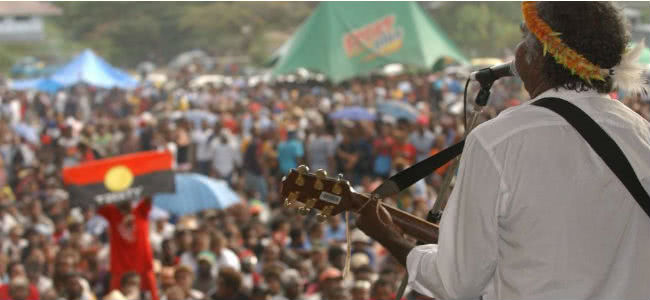Yunupingu, Yothi Yindi frontman and Australian of the Year, has died aged 56.
The well-known Indigenous musician had been fighting kidney disease for a number of years and passed away at his home in Yirrkala in Eastern Arnhem Land.
In 1986, Yunupingu founded Yothu Yindi and was responsible for co-writing their biggest hit, 1991’s ‘Treaty’, a powerful political statement that was also a commercial success that graced the #1 spot of the Australian charts for 22 weeks.
Yunupingu participated in a performance of the hit song with collaborators Peter Garrett and Paul Kelly as part of the 2012 ARIA Awards where Yothu Yindi were inducted into the ARIA Hall of Fame, recognised for their outstanding contribution to Australian music and crossing cultural divides and blending musical aspects of both indigenous and non-indigenous culture. The band’s sound was unique, appealing, and had a lasting impact on both the musical and political landscape in Australia and the world at large.
Their Hall of Fame induction was the latest in a string of recognition for Yothu Yinid, who have eight ARIA titles to their name from a total of 14 nominations for their six-album catalogue; stretching from the ‘Treaty’-featuring 1989 debut Homeland Movement to 2000’s Garma.
Last year the band celebrated its nearly three decade history with a career-spanning compilation, Healing Stone: The Best Of Yothu Yindi, which included the title track – a new composition between Mandawuy Yunupingu and INXS’s Andrew Farriss. “My heart is full of joy. I am so happy to see that in my lifetime Indigenous music has come such a long way.” – Mandawuy Yunupingu
Yunupingu was Yothu Yindi’s leader, which featured many esteemed Indigenous musicians amongst its lineup over the years, including Yunupingu’s nephew, Geoffrey Gurrumul Yunupingu, one of Australia’s most celebrated singers.
Education was another passion of Yunupingu’s; he was the first Aboriginal from Arnhem Land to gain a university degree. He became assistant principal of the Yirrkala Community School in 1989, and one year later, he took over to become the first Aboriginal principal in Australia. He remained principal until late 1991 when he departed to focus on his career with Yothu Yindi. In 1992, he was named Australian of the Year.
Yunupingu’s biographer, Robert Hillman, said the musician, educator, and activist always had a great sense of mission of his people, the Yolngu people.
“Music played an important part in the life of the Yolngu people all together. They are very musical people,” he told ABC News. “It was part of Mandawuy’s vision that music could become a political agent in making the broad mainstream Australia more aware of the Indigenous culture of his people.”
Mr. Hillman also says that Yunupingu took great pride in ‘Treaty’, not for bringing him fame or chart success, but for spotlighting the needs and voice of a culture.
“He was completely self-conscious to bring his culture to the more broad Australian culture,” he said. “He never had any sense of being a superstar and that there was anything wrong with putting the politics of his people right under the case of the broad Australian public.”
In more recent years, Yunupingu had suffered from poor health with advanced renal failure, which forced him onto dialysis three times a week at Darwin Hospital. Last December, he was rushed to hospital after collapsing at his home following his trip to Sydney for Yothu Yindi’s induction into the ARIA Hall of Fame.
The influential work of Yunupingu and Yothu Yindi are also to be recognised at the 2013 National Indigenous Music Awards (NIMA) in August, where an all-star cast will perform a tribute concert of Yothu Yindi’s music, with a roll call of singers fulfilling Yunupingu’s role, including the singer’s own grandson and East Journey frontman Rrawun Maymuru, and Melbourne soul-father Kutcha Edwards
Both singers also performed a cover of ‘Mainstream’ at Melbourne’s Art Centre in mid-May to announce NIMA’s Yothu Yindi tribute concert, with Madawuy Yunupingur remarking of the announcement: “My heart is full of joy. I am so happy to see that in my lifetime Indigenous music has come such a long way. To have these talented artists come together to honour the groundbreaking work of Yothu Yindi makes me proud beyond words. Yo Manymak.”
Yunupingu has always said he believed life should be balanced and in harmony, something he learned from his mother who taught him important Aboriginal ideas about how to live with people and with nature. His name, Yunupingu, means rock – rock that stands against time.
Yunupingu is survived by his wife, Yalmay, five daughters and four grandsons, as well as his musical nephew Gurrumul and grandson Rrawun Maymuru, who fronts East Journey.
Tributes for the Yothu Yindi frontman have been pouring in over social media, including from friend and musical collaborator Peter Garrett MP.
Can’t believe he’s gone, my dear friend. A path breaker and leader. A shining light for his people. Rest in peace Mr Yunupingu.
— Peter Garrett AM MP (@PGarrettMP) June 2, 2013
Goodbye, Mandawuy, master of balance. We sang for you tonight in Nashville. You showed me your country, brought… fb.me/1kzi97fhC
— Paul Kelly (@paul__kelly) June 3, 2013
Thank you for everything Yunupingu. abc.net.au/news/2013-06-0… @abcnews
— Missy Higgins (@missyhiggins) June 3, 2013
Thank you Mandawuy Yunupingu. Your heart remained huge. You did so good. Vale. instagram.com/p/aE6QiAzKl5/
— Clare Bowditch (@ClareBowditch) June 3, 2013
Sitting on the beach in WA on “WA Day” & thinking about this incredible man. abc.net.au/news/2013-06-0…
— Tim Minchin (@timminchin) June 3, 2013
Just to be in his company was a learning experience. My piece in @guardianaus #yothuyindi #RIP m.guardian.co.uk/world/2013/jun…
— GeorgeNegus (@GeorgeNegus) June 3, 2013

































